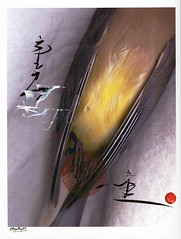At the beginning of A Wizard of Earthsea, Ursula K. Le Guin wrote an epigraph:
Only in silence the word,
only in dark the light,
only in dying life:
bright the hawk’s flight
on the empty sky.
The juxtaposition of opposites, along with the image of the hawk, brought to mind a painting of mine, Soft Breast Sharpe Talons, and a friend who I have been … what have we been doing? Exploring, adventuring, dying, awakening? I wouldn’t call it a relationship, but she said, we were relating.
Well, anyway.
She and it have come to mind and have been joined by these two writers, Le Guin and Jeanette Winterson. I check Winterson's website regularly for her monthly column. She usually brings a respite from my world while offering encouragement to continue.
So here, I pass on an abbreviated version of her thoughts for September. (You can read the full text here.)
This is the first time in my working life as a writer that I have felt compelled to work directly with the material in front of me – by that I mean the state of the world.
I haven’t made a polemic or a documentary, but The Stone Gods is a response to where we are now, and where this now might be taking us.
I believe that the role of the artist changes, according to the time that he or she must inhabit.
I have felt strongly that in our time, the inner life, the imaginative life, the life of the mind, needed strengthening and protection, because we live so much on the outside, pretending that all our needs can be met by a bit more shopping and better technology.
I have never been much interested in naturalistic writing – a kind of printed version of TV dramas, and I have tried to use the exactness of a heightened poetic language to prompt thought and to make new connections – not surface connections, but deeper joints.
I am as uninterested in fantasy writing as I am in naturalism – both feel like escapes from a real world that is rich and strange enough.
There are miracles – but these are not fantasies.
There are mysteries, but these are not supernatural inventions.
The creatures of myth – the minotaur, the winged lion, the blind god, the hanged man, are still with us, in new disguises.
The metaphors of swallowed hearts and genies in jars remain true.
We can put anything in what we write, provided that it belongs to our own fully realized central vision.
I wouldn’t call His Dark Materials, or Wizard of Earthsea, or Lord of the Rings, or The Weirdstone of Brisingamen fantasy writing;
each was written from a powerful place in the writer, and each uses mythology unravelled from our own DNA.
This kind of work has nothing to do with special effects Hollywood versions of dragons and heroes,
or the souped-up half-baked warlords/monsters books and games that come out of and feed into a regressive undeveloped imagination that shoots up on violence and comic-book storylines. ...
The best work is a cup that holds the liquid that you are.
The miracle is that someone else, very different to you, will also feel it …
This is achieved not because we are reading a slice of life – no slice of life can do more than fit in a few of us, but because a particular set of circumstances suddenly becomes universally relevant.
This happens when a book can go deeper than the top layer of life and into the subterranean place where emotion and imagination chemically react into self-revelation.
We learn about ourselves through someone not ourselves – it is like falling in love – the stranger brings the gift.
Friday, September 07, 2007
Only in Silence
Subscribe to:
Post Comments (Atom)


No comments:
Post a Comment